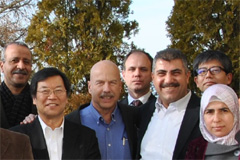UN calls for transparency and stakeholder involvement in tackling illegal traffic

Co-chairs of the TEG, Mr. Kazuhiko Takemoto (Japan) and Mr. Mohammed Khashashneh (Jordan) on each side of Mr. Jim Willis (Secretariat)
Geneva, 30 January 2013 – A United Nations expert group has agreed on a framework to strengthen the management of hazardous wastes and other wastes under the Basel Convention, the leading international treaty addressing threats posed by transboundary movements of wastes to human health and the environment.
The Technical Expert Group of the Basel Convention on the Control of Transboundary Movements of Hazardous Waste and their Disposal completed a framework for the environmentally sound management (ESM) of hazardous wastes and other wastes at its third meeting, held from 21 to 23 January 2013, in Glion, Switzerland.
Eighteen of the 30 international experts nominated by Parties to the Basel Convention were joined by 15 observers to finalize work on the framework.
The framework establishes a common understanding of what ESM encompasses and identifies tools and strategies to support and promote the implementation of ESM. It is intended as a practical guide for all stakeholders participating in the management of hazardous wastes and other wastes.
The Technical Expert Group discussed what are the main challenges related to the implementation of ESM, among them ensuring a uniform interpretation of ESM, tackling the problem of illegal traffic and ensuring the development of adequate national capacity for ESM.
The Group also considered how this framework and its elements might be linked to the issue of transboundary movement of hazardous and other wastes.
The framework is intended to address the problem of the harm that is caused throughout the world by inadequate waste management procedures and the fact that ESM is understood and implemented differently amongst Parties.
Transboundary movements should only take place if ESM is ensured. Adherence to the framework would reduce the need for transboundary movements to cases where this would present the best environmental outcome, for example where the state of export does not have adequate facilities to manage its wastes in-country. The framework also would assist authorities and other stakeholders to determine the legitimacy of any transboundary movements of wastes.
The Conference of the Parties to the Basel Convention had mandated a technical expert group to complete the development of a framework for the environmentally sound management of hazardous wastes and other wastes at its tenth meeting, held in Cartagena, Colombia, in October 2011, as part of the Indonesian-Swiss Country-led Initiative to improve the effectiveness of the Basel Convention.
The framework will be considered and possibly adopted at the eleventh meeting of the Conference of the Parties to the Basel Convention (COP 11) in April 2013, in Geneva, Switzerland.
Contact
Michael S. Jones, Public Information Officer, Secretariat of the Basel, Rotterdam and Stockholm Conventions, UN Environment Programme, +41 (0)22 917 86 68, (m) +41 79 730 44 95, e-mail: SafePlanet@unep.org
Susan Wingfield, Programme Officer, Secretariat of the Basel, Rotterdam and Stockholm Conventions, UN Environment Programme, +41 (0) 22 917 84 06, e-mail: susan.wingfield@unep.org
Further Resources:
Third meeting of the Technical Expert Group page